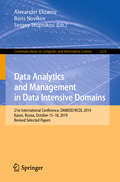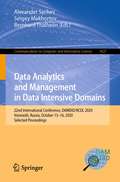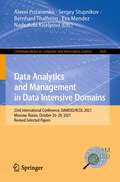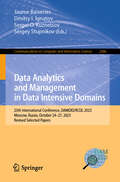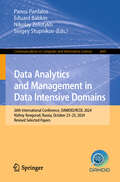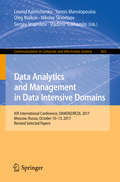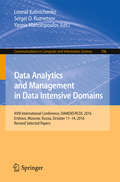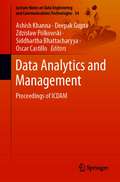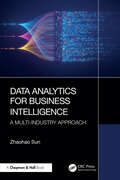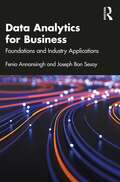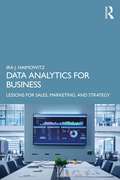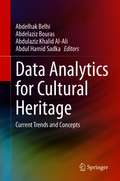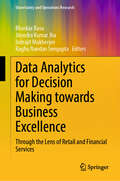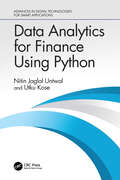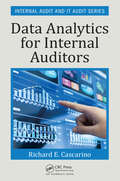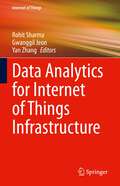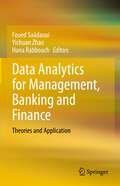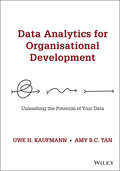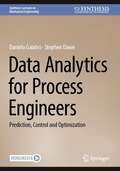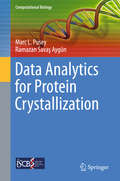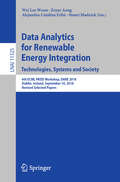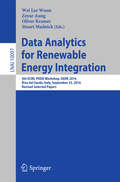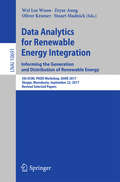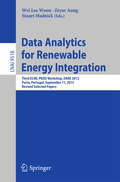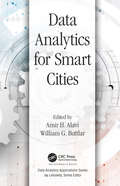- Table View
- List View
Data Analytics and Management in Data Intensive Domains: 21st International Conference, DAMDID/RCDL 2019, Kazan, Russia, October 15–18, 2019, Revised Selected Papers (Communications in Computer and Information Science #1223)
by Sergey Stupnikov Boris Novikov Alexander ElizarovThis book constitutes the post-conference proceedings of the 21st International Conference on Data Analytics and Management in Data Intensive Domains, DAMDID/RCDL 2019, held in Kazan, Russia, in October 2019.The 11 revised full papers presented together with four invited papers were carefully reviewed and selected from 52 submissions. The papers are organized in the following topical sections: advanced data analysis methods; data infrastructures and integrated information systems; models, ontologies and applications; data analysis in astronomy; information extraction from text; distributed computing; data science for education.
Data Analytics and Management in Data Intensive Domains: 22nd International Conference, DAMDID/RCDL 2020, Voronezh, Russia, October 13–16, 2020, Selected Proceedings (Communications in Computer and Information Science #1427)
by Bernhard Thalheim Alexander Sychev Sergey MakhortovThis book constitutes the post-conference proceedings of the 22nd International Conference on Data Analytics and Management in Data Intensive Domains, DAMDID/RCDL 2020, held in Voronezh, Russia, in October 2020*.The 16 revised full papers and two keynotes were carefully reviewed and selected from 60 submissions. The papers are organized in the following topical sections: data Integration, conceptual models and ontologies; data management in semantic web; data analysis in medicine; data analysis in astronomy; information extraction from text.* The conference was held virtually due to the COVID-19 pandemic.
Data Analytics and Management in Data Intensive Domains: 23rd International Conference, DAMDID/RCDL 2021, Moscow, Russia, October 26–29, 2021, Revised Selected Papers (Communications in Computer and Information Science #1620)
by Bernhard Thalheim Sergey Stupnikov Alexei Pozanenko Eva Mendez Nadezhda KiselyovaThis book constitutes the post-conference proceedings of the 23rd International Conference on Data Analytics and Management in Data Intensive Domains, DAMDID/RCDL 2021, held in Moscow, Russia, in October 2021*.The 16 revised full papers were carefully reviewed and selected from 61 submissions. The papers are organized in the following topical sections: problem solving infrastructures, experiment organization, and machine learning applications; data analysis in astronomy; data analysis in material and earth sciences; information extraction from text* The conference was held virtually due to the COVID-19 pandemic.
Data Analytics and Management in Data Intensive Domains: 25th International Conference, DAMDID/RCDL 2023, Moscow, Russia, October 24–27, 2023, Revised Selected Papers (Communications in Computer and Information Science #2086)
by Dmitry I. Ignatov Jaume Baixeries Sergei O. Kuznetsov Sergey StupnikovThis book constitutes the post-conference proceedings of the 25th International Conference on Data Analytics and Management in Data Intensive Domains, DAMDID/RCDL 2023, held in Moscow, Russia, during 24-27 October 2023. The 21 papers presented here were carefully reviewed and selected from 75 submissions. These papers are organized in the following topical sections: Data Models and Knowledge Graphs; Databases in Data Intensive Domains; Machine learning methods and applications; Data Analysis in Astronomy & Information extraction from text. Papers from keynote talks have also been included in this book.
Data Analytics and Management in Data Intensive Domains: 26th International Conference, DAMDID/RCDL 2024, Nizhny Novgorod, Russia, October 23–25, 2024, Revised Selected Papers (Communications in Computer and Information Science #2641)
by Eduard Babkin Panos Pardalos Sergey Stupnikov Nikolay ZolotykhThis book includes the revised selected papers from the 26th International Conference on Data Analytics and Management in Data Intensive Domains, DAMDID/RCDL 2024, held in Nizhny Novgorod, Russia, during October 22-25, 2024. The 15 full papers and 5 short papers presented in this volume were carefully reviewed and selected from 71 submissions. They focus on Conceptual Modeling and Ontologies; Generative and Transformer-Based Models; Machine Learning Methods and Applications and Statistical Methods and Applications.
Data Analytics and Management in Data Intensive Domains: XIX International Conference, DAMDID/RCDL 2017, Moscow, Russia, October 10–13, 2017, Revised Selected Papers (Communications in Computer and Information Science #822)
by Yannis Manolopoulos Leonid Kalinichenko Oleg Malkov Nikolay Skvortsov Sergey Stupnikov Vladimir SukhomlinThis book constitutes the refereed proceedings of the 19th International Conference on Data Analytics and Management in Data Intensive Domains, DAMDID/RCDL 2017, held in Moscow, Russia, in October 2017.The 16 revised full papers presented together with three invited papers were carefully reviewed and selected from 75 submissions. The papers are organized in the following topical sections: data analytics; next generation genomic sequencing: challenges and solutions; novel approaches to analyzing and classifying of various astronomical entities and events; ontology population in data intensive domains; heterogeneous data integration issues; data curation and data provenance support; and temporal summaries generation.
Data Analytics and Management in Data Intensive Domains: XVIII International Conference, DAMDID/RCDL 2016, Ershovo, Moscow, Russia, October 11 -14, 2016, Revised Selected Papers (Communications in Computer and Information Science #706)
by Yannis Manolopoulos Leonid Kalinichenko Sergei O. KuznetsovThis book constitutes the refereed proceedings of the 28th International Conference on Data Analytics and Management in Data Intensive Domains, DAMDID/RCDL 2016, held in Ershovo, Moscow, Russia, in October 2016. The 16 revised full papers presented together with one invited talk and two keynote papers were carefully reviewed and selected from 57 submissions. The papers are organized in topical sections on semantic modeling in data intensive domains; knowledge and learning management; text mining; data infrastructures in astrophysics; data analysis; research infrastructures; position paper.
Data Analytics and Management: Proceedings of ICDAM (Lecture Notes on Data Engineering and Communications Technologies #54)
by Oscar Castillo Siddhartha Bhattacharyya Deepak Gupta Ashish Khanna Zdzisław PólkowskiThis book includes original unpublished contributions presented at the International Conference on Data Analytics and Management (ICDAM 2020), held at Jan Wyzykowski University, Poland, during June 2020. The book covers the topics in data analytics, data management, big data, computational intelligence, and communication networks. The book presents innovative work by leading academics, researchers, and experts from industry which is useful for young researchers and students.
Data Analytics for Business Intelligence: A Multi-Industry Approach
by Zhaohao SunThis book studies data, analytics, and intelligence using Boolean structure. Chapters dive into the theories, foundations, technologies, and methods of data, analytics, and intelligence.The primary aim of this book is to convey the theories and technologies of data, analytics, and intelligence with applications to readers based on systematic generalization and specialization. Sun uses the Boolean structure to deconstruct all books and papers related to data, analytics, and intelligence and to reorganize them to reshape the world of big data, data analytics, analytics intelligence, data science, and artificial intelligence. Multi-industry applications in business, management, and decision-making are provided. Cutting-edge theories, technologies, and applications of data, analytics, and intelligence and their integration are also explored. Overall, this book provides original insights on sharing computing, insight computing, platform computing, a calculus of intelligent analytics and intelligent business analytics, meta computing, data analyticizing, DDPP (descriptive, diagnostic, predictive, and prescriptive) computing, and analytics.This book is a useful resource with multi-industry applications for scientists, engineers, data analysts, educators, and university students.
Data Analytics for Business: Foundations and Industry Applications
by Fenio Annansingh Joseph Bon SesayData analytics underpin our modern data-driven economy. This textbook explains the relevance of data analytics at the firm and industry levels, tracing the evolution and key components of the field, and showing how data analytics insights can be leveraged for business results. The first section of the text covers key topics such as data analytics tools, data mining, business intelligence, customer relationship management, and cybersecurity. The chapters then take an industry focus, exploring how data analytics can be used in particular settings to strengthen business decision-making. A range of sectors are examined, including financial services, accounting, marketing, sport, health care, retail, transport, and education. With industry case studies, clear definitions of terminology, and no background knowledge required, this text supports students in gaining a solid understanding of data analytics and its practical applications. PowerPoint slides, a test bank of questions, and an instructor’s manual are also provided as online supplements. This will be a valuable text for undergraduate level courses in data analytics, data mining, business intelligence, and related areas.
Data Analytics for Business: Lessons for Sales, Marketing, and Strategy
by Ira J. HaimowitzInterest in applying analytics, machine learning, and artificial intelligence to sales and marketing has grown dramatically, with no signs of slowing down. This book provides essential guidance to apply advanced analytics and data mining techniques to real-world business applications. The foundation of this text is the author’s 20-plus years of developing and delivering big data and artificial intelligence solutions across multiple industries: financial services, pharmaceuticals, consumer packaged goods, media, and retail. He provides guidelines and summarized cases for those studying or working in the fields of data science, data engineering, and business analytics. The book also offers a distinctive style: a series of essays, each of which summarizes a critical lesson or provides a step-by-step business process, with specific examples of successes and failures. Sales and marketing executives, project managers, business and engineering professionals, and graduate students will find this clear and comprehensive book the ideal companion when navigating the complex world of big data analytics.
Data Analytics for Cultural Heritage: Current Trends and Concepts
by Abdelaziz Bouras Abdul Hamid Sadka Abdelhak Belhi Abdulaziz Khalid Al-AliThis book considers the challenges related to the effective implementation of artificial intelligence (AI) and machine learning (ML) technologies to the cultural heritage digitization process. Particular focus is placed on improvements to the data acquisition stage, as well as the data enrichment and curation stages, using advanced artificial intelligence techniques and tools. An emphasis is placed on recent applications related to deep learning for visual recognition, generative models, natural language processing, and super resolution. The book is a valuable reference for researchers working in the multidisciplinary field of cultural heritage and AI, as well as professional experts in the art and culture domains, such as museums, libraries, and historic sites and buildings. Reports on techniques and methods that leverage AI and machine learning and their impact on the digitization of cultural heritage; Addresses challenges of improving data acquisition, enrichment and management processes;Highlights contributions from international researchers from diverse fields and subject areas.
Data Analytics for Decision Making towards Business Excellence: Through the Lens of Retail and Financial Services (Uncertainty and Operations Research)
by Raghu Nandan Sengupta Bhaskar Basu Jitendra Kumar Jha Indrajit MukherjeeThis edited volume collates discussions on latest challenges, opportunities, trends and practices applicable to two major business sectors -- retail and financial services -- and chapters are segregated accordingly. It explores how these sectors are increasingly becoming data-intensive, and how ways of handling, manipulating, exploiting and evaluating data continues to change in this era of big data. Part A of the book looks into better understanding of marketing metrics/ strategy/ theory and practice using retail analytics. Topics being explored are: inventory, assortment, and promotion effectiveness; pricing strategies; brand/category switching and customer loyalty; customer profitability; customer engagement; cross-buying and up-buying; synergistic effects of online and offline channels and retail innovations; effectiveness of different type of distribution channels; customer experience; service excellence/failure/recovery; digitalizationin retailing; consumer behaviour and marketing in omni-channel retail environments. In Part B, topics of relevance include financial aspects of data analytics such as: behavioral data finance; Big data and credit risk; data analytics and financial econometrics; financial sentiment and news analysis; information and evidence in digital age; policy-making mechanisms and modelling approaches; stock market manipulation detection; stock market trading strategies using data analytics; high frequency/ algorithmic trading with AI; financial forecasting including interest rate/ old price/ crude oil/ macroeconomic variables/ FOREX/ cryptocurrency price; deep learning for finance and insurance applications. The book covers diverse and advanced concepts with practical examples to supplement and complement varied topics of interest within the domain. Thus students, researchers, and practitioners will undoubtedly find novel and new ideas for data analytics in the realm of two critical domain areas: retail and financial services.
Data Analytics for Finance Using Python (Advances in Digital Technologies for Smart Applications)
by Nitin Jaglal Untwal Utku KoseUnlock the power of data analytics in finance with this comprehensive guide. Data Analytics for Finance Using Python is your key to unlocking the secrets of the financial markets.In this book, you’ll discover how to harness the latest data analytics techniques, including machine learning and inferential statistics, to make informed investment decisions and drive business success. With a focus on practical application, this book takes you on a journey from the basics of data preprocessing and visualization to advanced modeling techniques for stock price prediction.Through real-world case studies and examples, you’ll learn how to: Uncover hidden patterns and trends in financial data Build predictive models that drive investment decisions Optimize portfolio performance using data-driven insights Stay ahead of the competition with cutting-edge data analytics techniques Whether you’re a finance professional seeking to enhance your data analytics skills or a researcher looking to advance the field of finance through data-driven insights, this book is an essential resource. Dive into the world of data analytics in finance and discover the power to make informed decisions, drive business success, and stay ahead of the curve.This book will be helpful for students, researchers, and users of machine learning and financial tools in the disciplines of commerce, management, and economics.
Data Analytics for Internal Auditors (Security, Audit and Leadership Series #9)
by Richard E. CascarinoThere are many webinars and training courses on Data Analytics for Internal Auditors, but no handbook written from the practitioner’s viewpoint covering not only the need and the theory, but a practical hands-on approach to conducting Data Analytics. The spread of IT systems makes it necessary that auditors as well as management have the ability to examine high volumes of data and transactions to determine patterns and trends. The increasing need to continuously monitor and audit IT systems has created an imperative for the effective use of appropriate data mining tools. This book takes an auditor from a zero base to an ability to professionally analyze corporate data seeking anomalies.
Data Analytics for Internet of Things Infrastructure (Internet of Things)
by Rohit Sharma Yan Zhang Gwanggil JeonThis book provides techniques for the deployment of semantic technologies in data analysis along with the latest applications across the field such as Internet of Things (IoT). The authors focus on the use of the IoT and big data in business intelligence, data management, Hadoop, machine learning, cloud, smart cities, etc. They discuss how the generation of big data by IoT has ruptured the existing data processing capacity of IoT and recommends the adoption of data analytics to strengthen solutions. The book addresses the challenges in designing the web based IoT system, provides a comparative analysis of different advanced approaches in industries, and contains an analysis of databases to provide expert systems. The book aims to bring together leading academic scientists, researchers, and research scholars to exchange and share their experiences and research results on all aspects of IoT and big data analytics.
Data Analytics for Management, Banking and Finance: Theories and Application
by Yichuan Zhao Foued Saâdaoui Hana RabbouchThis book is a practical guide on the use of various data analytics and visualization techniques and tools in the banking and financial sectors. It focuses on how combining expertise from interdisciplinary areas, such as machine learning and business analytics, can bring forward a shared vision on the benefits of data science from the research point of view to the evaluation of policies. It highlights how data science is reshaping the business sector. It includes examples of novel big data sources and some successful applications on the use of advanced machine learning, natural language processing, networks analysis, and time series analysis and forecasting, among others, in the banking and finance.It includes several case studies where innovative data science models is used to analyse, test or model some crucial phenomena in banking and finance. At the same time, the book is making an appeal for a further adoption of these novel applications in the field of economics and finance so that they can reach their full potential and support policy-makers and the related stakeholders in the transformational recovery of our societies.The book is for stakeholders involved in research and innovation in the banking and financial sectors, but also those in the fields of computing, IT and managerial information systems, helping through this new theory to better specify the new opportunities and challenges. The many real cases addressed in this book also provide a detailed guide allowing the reader to realize the latest methodological discoveries and the use of the different Machine Learning approaches (supervised, unsupervised, reinforcement, deep, etc.) and to learn how to use and evaluate performance of new data science tools and frameworks
Data Analytics for Organisational Development: Unleashing the Potential of Your Data
by Uwe H. Kaufmann Amy B. TanA practical guide for anyone who aspires to become data analytics–savvy Data analytics has become central to the operation of most businesses, making it an increasingly necessary skill for every manager and for all functions across an organisation. Data Analytics for Organisational Development: Unleashing the Potential of Your Data introduces a methodical process for gathering, screening, transforming, and analysing the correct datasets to ensure that they are reliable tools for business decision-making. Written by a Six Sigma Master Black Belt and a Lean Six Sigma Black Belt, this accessible guide explains and illustrates the application of data analytics for organizational development and design, with particular focus on Customer and Strategy Analytics, Operations Analytics and Workforce Analytics. Designed as both a handbook and workbook, Data Analytics for Organisational Development presents the application of data analytics for organizational design and development using case studies and practical examples. It aims to help build a bridge between data scientists, who have less exposure to actual business issues, and the "non-data scientists." With this guide, anyone can learn to perform data analytics tasks from translating a business question into a data science hypothesis to understanding the data science results and making the appropriate decisions. From data acquisition, cleaning, and transformation to analysis and decision making, this book covers it all. It also helps you avoid the pitfalls of unsound decision making, no matter where in the value chain you work. Follow the “Five Steps of a Data Analytics Case” to arrive at the correct business decision based on sound data analysis Become more proficient in effectively communicating and working with the data experts, even if you have no background in data science Learn from cases and practical examples that demonstrate a systematic method for gathering and processing data accurately Work through end-of-chapter exercises to review key concepts and apply methods using sample data sets Data Analytics for Organisational Development includes downloadable tools for learning enrichment, including spreadsheets, Power BI slides, datasets, R analysis steps and more. Regardless of your level in your organisation, this book will help you become savvy with data analytics, one of today’s top business tools.
Data Analytics for Process Engineers: Prediction, Control and Optimization (Synthesis Lectures on Mechanical Engineering)
by Daniela Galatro Stephen DaweThis book provides an industry-oriented data analytics approach for process engineers, including data acquisition methods and sources, exploratory data analysis and sensitivity analysis, data-based modelling for prediction, data-based modelling for monitoring and control, and data-based optimization of processes. While many of the current data analytics books target business-related problems, the rationale for this book is a specific need to understand and select applicable data analytics approaches pragmatically to analyze process engineering–related problems; this tailored solution for engineers gets amalgamated with governing equations, and in several cases, with the physical understanding of the phenomenon being analyzed. We also consider this book strategically conceived to help map Education 4.0 with Industry 4.0 since it can support undergraduate and graduate students to gain valuable and applicable data analytics stills that can be further used in their workplace. Moreover, it can be used as a reference book for professionals, a quick reference to data analytics tools that can facilitate and/or optimize their process engineering tasks.
Data Analytics for Protein Crystallization
by Marc L. Pusey Ramazan Savaş AygünThis unique text/reference presents an overview of the computational aspects of protein crystallization, describing how to build robotic high-throughput and crystallization analysis systems. The coverage encompasses the complete data analysis cycle, including the set-up of screens by analyzing prior crystallization trials, the classification of crystallization trial images by effective feature extraction, the analysis of crystal growth in time series images, the segmentation of crystal regions in images, the application of focal stacking methods for crystallization images, and the visualization of trials.Topics and features: describes the fundamentals of protein crystallization, and the scoring and categorization of crystallization image trials; introduces a selection of computational methods for protein crystallization screening, and the hardware and software architecture for a basic high-throughput system; presents an overview of the image features used in protein crystallization classification, and a spatio-temporal analysis of protein crystal growth; examines focal stacking techniques to avoid blurred crystallization images, and different thresholding methods for binarization or segmentation; discusses visualization methods and software for protein crystallization analysis, and reviews alternative methods to X-ray diffraction for obtaining structural information; provides an overview of the current challenges and potential future trends in protein crystallization.This interdisciplinary work serves as an essential reference on the computational and data analytics components of protein crystallization for the structural biology community, in addition to computer scientists wishing to enter the field of protein crystallization.
Data Analytics for Renewable Energy Integration. Technologies, Systems and Society: 6th ECML PKDD Workshop, DARE 2018, Dublin, Ireland, September 10, 2018, Revised Selected Papers (Lecture Notes in Computer Science #11325)
by Wei Lee Woon Zeyar Aung Stuart Madnick Alejandro Catalina FeliúThis book constitutes the revised selected papers from the 6th ECML PKDD Workshop on Data Analytics for Renewable Energy Integration, DARE 2018, held in Dublin, Ireland, in September 2018. The 9 papers presented in this volume were carefully reviewed and selected for inclusion in this book and handle topics such as time series forecasting, the detection of faults, cyber security, smart grid and smart cities, technology integration, demand response, and many others.
Data Analytics for Renewable Energy Integration: 4th ECML PKDD Workshop, DARE 2016, Riva del Garda, Italy, September 23, 2016, Revised Selected Papers (Lecture Notes in Computer Science #10097)
by Oliver Kramer Wei Lee Woon Zeyar Aung Stuart MadnickThis book constitutes revised selected papers from the second ECML PKDD Workshop on Data Analytics for Renewable Energy Integration, DARE 2014, held in Nancy, France, in September 2014. The 11 papers presented in this volume were carefully reviewed and selected for inclusion in this book.
Data Analytics for Renewable Energy Integration: 5th ECML PKDD Workshop, DARE 2017, Skopje, Macedonia, September 22, 2017, Revised Selected Papers (Lecture Notes in Computer Science #10691)
by Wei Lee Woon, Zeyar Aung, Oliver Kramer and Stuart MadnickThis book constitutes revised selected papers from the 5th ECML PKDD Workshop on Data Analytics for Renewable Energy Integration, DARE 2017, held in Skopje, Macedonia, in September 2017. The 11 papers presented in this volume were carefully reviewed and selected for inclusion in this book and handle topics such as time series forecasting, the detection of faults, cyber security, smart grid and smart cities, technology integration, demand response and many others.
Data Analytics for Renewable Energy Integration: Third ECML PKDD Workshop, DARE 2015, Porto, Portugal, September 11, 2015. Revised Selected Papers (Lecture Notes in Computer Science #9518)
by Wei Lee Woon Zeyar Aung Stuart MadnickThis book constitutes revised selected papers from the second ECML PKDD Workshop on Data Analytics for Renewable Energy Integration, DARE 2014, held in Nancy, France, in September 2014. The 11 papers presented in this volume were carefully reviewed and selected for inclusion in this book.
Data Analytics for Smart Cities (Data Analytics Applications)
by William G. Buttlar Amir AlaviThe development of smart cities is one of the most important challenges over the next few decades. Governments and companies are leveraging billions of dollars in public and private funds for smart cities. Next generation smart cities are heavily dependent on distributed smart sensing systems and devices to monitor the urban infrastructure. The smart sensor networks serve as autonomous intelligent nodes to measure a variety of physical or environmental parameters. They should react in time, establish automated control, and collect information for intelligent decision-making. In this context, one of the major tasks is to develop advanced frameworks for the interpretation of the huge amount of information provided by the emerging testing and monitoring systems. Data Analytics for Smart Cities brings together some of the most exciting new developments in the area of integrating advanced data analytics systems into smart cities along with complementary technological paradigms such as cloud computing and Internet of Things (IoT). The book serves as a reference for researchers and engineers in domains of advanced computation, optimization, and data mining for smart civil infrastructure condition assessment, dynamic visualization, intelligent transportation systems (ITS), cyber-physical systems, and smart construction technologies. The chapters are presented in a hands-on manner to facilitate researchers in tackling applications. Arguably, data analytics technologies play a key role in tackling the challenge of creating smart cities. Data analytics applications involve collecting, integrating, and preparing time- and space-dependent data produced by sensors, complex engineered systems, and physical assets, followed by developing and testing analytical models to verify the accuracy of results. This book covers this multidisciplinary field and examines multiple paradigms such as machine learning, pattern recognition, statistics, intelligent databases, knowledge acquisition, data visualization, high performance computing, and expert systems. The book explores new territory by discussing the cutting-edge concept of Big Data analytics for interpreting massive amounts of data in smart city applications.
